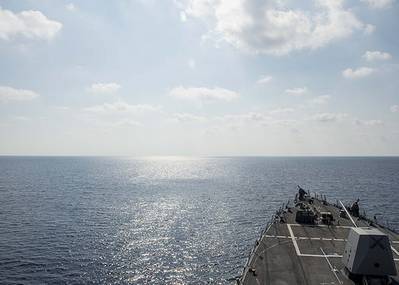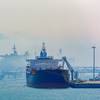China scrambled fighter jets on Tuesday as a U.S. navy ship sailed close to a disputed reef in the South China Sea, a patrol China denounced as an illegal threat to peace which only went to show its defence installations in the area were necessary.
Guided missile destroyer the USS William P. Lawrence travelled within 12 nautical miles (22 km) of Chinese-occupied Fiery Cross Reef, U.S. Defense Department spokesman Bill Urban said.
The so-called freedom of navigation operation was undertaken to "challenge excessive maritime claims" by China, Taiwan, and Vietnam which were seeking to restrict navigation rights in the South China Sea, Urban said.
"These excessive maritime claims are inconsistent with international law as reflected in the Law of the Sea Convention in that they purport to restrict the navigation rights that the United States and all states are entitled to exercise," Urban said in an emailed statement.
China and the United States have traded accusations of militarising the South China Sea as China undertakes large-scale land reclamation and construction on disputed features while the United States has increased its patrols and exercises.
Facilities on Fiery Cross Reef include a 3,000-metre (10,000-foot) runway which the United States worries China will use to press its extensive territorial claims at the expense of weaker rivals.
China's Defence Ministry said two fighter jets were scrambled and three warships shadowed the U.S. ship, telling it to leave.
The U.S. patrol "again proves that China's construction of defensive facilities on the relevant reefs in the Nansha Islands is completely reasonable and totally necessary", it said, using China's name for the Spratly Islands where much of its reclamation work is taking place.
Foreign Ministry spokesman Lu Kang said the U.S. ship illegally entered Chinese waters.
"This action by the U.S. side threatened China's sovereignty and security interests, endangered the staff and facilities on the reef, and damaged regional peace and stability," he told a daily news briefing.
U.S. Secretary of State John Kerry waved aside a question as to whether the U.S. aim was to send a message ahead of a visit to Asia by President Barack Obama this month.
"This is not a pointed strategy calculated to do anything except keep a regular process of freedom of navigation operations underway," he told reporters in London.
Sensitive Area
China claims most of the South China Sea, through which $5 trillion in ship-borne trade passes every year. The Philippines, Vietnam, Malaysia, Taiwan and Brunei have overlapping claims.
The Pentagon last month called on China to reaffirm it has no plans to deploy military aircraft in the Spratly Islands after China used a military plane to evacuate sick workers from Fiery Cross.
"Fiery Cross is sensitive because it is presumed to be the future hub of Chinese military operations in the South China Sea, given its already extensive infrastructure, including its large and deep port and 3,000-metre runway," said Ian Storey, a South China Sea expert at Singapore's ISEAS Yusof Ishak Institute.
"The timing is interesting, too. It is a show of U.S. determination ahead of President Obama's trip to Vietnam."
Speaking in Vietnam, Daniel Russel, assistant secretary of state for East Asia and the Pacific, said freedom of navigation operations were important for smaller nations.
"If the world's most powerful navy cannot sail where international law permits, then what happens to the ships of navy of smaller countries?" Russel told reporters before news of the operation was made public.
China has reacted with anger to previous U.S. freedom of navigation operations, including the overflight of fighter planes near the disputed Scarborough Shoal last month, and when long-range U.S. bombers flew near Chinese facilities under construction on Cuarteron Reef in the Spratlys last November.
U.S. naval officials believe China has plans to start reclamation and construction activities on Scarborough Shoal, which sits further north of the Spratlys within the Philippines-claimed 200-nautical-mile (370-km) exclusive economic zone.
Tough-talking city mayor Rodrigo Duterte, who looks set to become president of the Philippines after an election on Monday, has proposed multilateral talks on the South China Sea.
A Chinese diplomat warned last week that criticism of China over the South China Sea would rebound like a coiled spring.
(By Michael Martina, Greg Torode and Ben Blanchard; Additional reporting by David Brunnstrom in Paris and London, and My Pham in Hanoi; Writing by Ben Blanchard; Editing by Robert Birsel and James Dalgleish)











